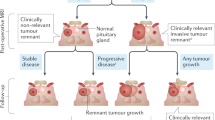Abstract
We report the case of a 44-year-old male patient with an aggressive silent corticotroph cell pituitary adenoma, subtype 2. In that it progressed to carcinoma despite temozolomide administration, anti-VEGF therapy was begun. MRI, PET scan and pathologic analysis were undertaken. After 10 months of anti-VEGF (bevacizumab) treatment no progression of the lesion was noted. The tumor was biopsied and morphological analysis showed severe cell injury, vascular abnormalities and fibrosis. Bevacizumab treatment has continued for additional 16 months to present with stabilization of disease as documented on serial MRI and PET scans. This is the first case of a bevacizumab-treated pituitary carcinoma with long-term, now 26 months, control of disease. The present findings are promising in that anti-angiogenic therapy appears to represent a new option in the treatment of aggressive pituitary tumors.


Similar content being viewed by others
References
Ellis LM, Hicklin DJ (2008) VEGF-targeted therapy: mechanisms of anti-tumour activity. Nat Rev Cancer 8(8):579–591. doi:10.1038/nrc2403
Zagzag D, Lukyanov Y, Lan L, Ali MA, Esencay M, Mendez O, Yee H, Voura EB, Newcomb EW (2006) Hypoxia-inducible factor 1 and VEGF upregulate CXCR4 in glioblastoma: implications for angiogenesis and glioma cell invasion. Lab Invest 86(12):1221–1232. doi:10.1038/labinvest.3700482
Kim KJ, Li B, Winer J, Armanini M, Gillett N, Phillips HS, Ferrara N (1993) Inhibition of vascular endothelial growth factor-induced angiogenesis suppresses tumour growth in vivo. Nature 362(6423):841–844. doi:10.1038/362841a0
Kerbel RS (2008) Tumor angiogenesis. N Engl J Med 358(19):2039–2049. doi:10.1056/NEJMra0706596
Wilson WR, Hay MP (2011) Targeting hypoxia in cancer therapy. Nat Rev Cancer 11(6):393–410. doi:10.1038/nrc3064
Gaur P, Bose D, Samuel S, Ellis LM (2009) Targeting tumor angiogenesis. Semin Oncol 36(2 suppl 1):S12–S19. doi:10.1053/j.seminoncol.2009.02.002
Martin DF, Maguire MG, Ying GS, Grunwald JE, Fine SL, Jaffe GJ (2011) Ranibizumab and bevacizumab for neovascular age-related macular degeneration. N Engl J Med 364(20):1897–1908. doi:10.1056/NEJMoa1102673
Folkman J (1971) Tumor angiogenesis: therapeutic implications. N Engl J Med 285(21):1182–1186. doi:10.1056/NEJM197111182852108
Moshkin O, Syro LV, Scheithauer BW, Ortiz LD, Fadul CE, Uribe H, Gonzalez R, Cusimano M, Horvath E, Rotondo F, Kovacs K (2011) Aggressive silent corticotroph adenoma progressing to pituitary carcinoma. The role of temozolomide therapy. Hormones (Athens) 10(2):162–167
Krause DS, Van Etten RA (2005) Tyrosine kinases as targets for cancer therapy. N Engl J Med 353(2):172–187. doi:10.1056/NEJMra044389
Ferrara N, Hillan KJ, Novotny W (2005) Bevacizumab (Avastin), a humanized anti-VEGF monoclonal antibody for cancer therapy. Biochem Biophys Res Commun 333(2):328–335. doi:10.1016/j.bbrc.2005.05.132
Presta LG, Chen H, O’Connor SJ, Chisholm V, Meng YG, Krummen L, Winkler M, Ferrara N (1997) Humanization of an anti-vascular endothelial growth factor monoclonal antibody for the therapy of solid tumors and other disorders. Cancer Res 57(20):4593–4599
Chamberlain MC, Johnston S (2009) Salvage chemotherapy with bevacizumab for recurrent alkylator-refractory anaplastic astrocytoma. J Neurooncol 91(3):359–367. doi:10.1007/s11060-008-9722-2
Jouanneau E (2008) Angiogenesis and gliomas: current issues and development of surrogate markers. Neurosurgery 62(1):31–50. doi:10.1227/01.NEU.0000311060.65002.4E00006123-200801000-00003 discussion 50–32
Norden AD, Drappatz J, Wen PY (2008) Antiangiogenic therapy in malignant gliomas. Curr Opin Oncol 20(6):652–661. doi:10.1097/CCO.0b013e32831186ba00001622-200811000-00009
Norden AD, Drappatz J, Muzikansky A, David K, Gerard M, McNamara MB, Phan P, Ross A, Kesari S, Wen PY (2009) An exploratory survival analysis of anti-angiogenic therapy for recurrent malignant glioma. J Neurooncol 92(2):149–155. doi:10.1007/s11060-008-9745-8
Kioi M, Vogel H, Schultz G, Hoffman RM, Harsh GR, Brown JM (2010) Inhibition of vasculogenesis, but not angiogenesis, prevents the recurrence of glioblastoma after irradiation in mice. J Clin Invest 120(3):694–705. doi:10.1172/JCI4028340283
Torcuator R, Zuniga R, Mohan YS, Rock J, Doyle T, Anderson J, Gutierrez J, Ryu S, Jain R, Rosenblum M, Mikkelsen T (2009) Initial experience with bevacizumab treatment for biopsy confirmed cerebral radiation necrosis. J Neurooncol 94(1):63–68. doi:10.1007/s11060-009-9801-z
Syro LV, Ortiz LD, Scheithauer BW, Lloyd R, Lau Q, Gonzalez R, Uribe H, Cusimano M, Kovacs K, Horvath E (2011) Treatment of pituitary neoplasms with temozolomide: a review. Cancer 117(3):454–462. doi:10.1002/cncr.25413
McCormack AI, Wass JA, Grossman AB (2011) Aggressive pituitary tumours: the role of temozolomide and the assessment of MGMT status. Eur J Clin Invest. doi:10.1111/j.1365-2362.2011.02520.x
Tebbutt NC, Murphy F, Zannino D, Wilson K, Cummins MM, Abdi E, Strickland AH, Lowenthal RM, Marx G, Karapetis C, Shannon J, Goldstein D, Nayagam SS, Blum R, Chantrill L, Simes RJ, Price TJ (2011) Risk of arterial thromboembolic events in patients with advanced colorectal cancer receiving bevacizumab. Ann Oncol 22(8):1834–1838. doi:10.1093/annonc/mdq702
Norden AD, Drappatz J, Ciampa AS, Doherty L, LaFrankie DC, Kesari S, Wen PY (2009) Colon perforation during antiangiogenic therapy for malignant glioma. Neuro Oncol 11(1):92–95. doi:10.1215/15228517-2008-071
Helfrich I, Scheffrahn I, Bartling S, Weis J, von Felbert V, Middleton M, Kato M, Ergun S, Schadendorf D (2010) Resistance to antiangiogenic therapy is directed by vascular phenotype, vessel stabilization, and maturation in malignant melanoma. J Exp Med 207(3):491–503. doi:10.1084/jem.20091846
Azam F, Mehta S, Harris AL (2010) Mechanisms of resistance to antiangiogenesis therapy. Eur J Cancer 46(8):1323–1332. doi:10.1016/j.ejca.2010.02.020
Paez-Ribes M, Allen E, Hudock J, Takeda T, Okuyama H, Vinals F, Inoue M, Bergers G, Hanahan D, Casanovas O (2009) Antiangiogenic therapy elicits malignant progression of tumors to increased local invasion and distant metastasis. Cancer Cell 15(3):220–231. doi:10.1016/j.ccr.2009.01.027
Cheshier SH, Kalani MY, Lim M, Ailles L, Huhn SL, Weissman IL (2009) A neurosurgeon’s guide to stem cells, cancer stem cells, and brain tumor stem cells. Neurosurgery 65(2):237–249. doi:10.1227/01.NEU.0000349921.14519.2A00006123-200908000-00003; discussion 249–250; quiz N236
Friedman HS, Prados MD, Wen PY, Mikkelsen T, Schiff D, Abrey LE, Yung WK, Paleologos N, Nicholas MK, Jensen R, Vredenburgh J, Huang J, Zheng M, Cloughesy T (2009) Bevacizumab alone and in combination with irinotecan in recurrent glioblastoma. J Clin Oncol 27(28):4733–4740. doi:10.1200/JCO.2008.19.8721
Acknowledgments
Authors are grateful to the Jarislowsky and Lloyd Carr Harris Foundations for their continuous support. The authors thank Mrs. Denise Chase of Mayo Clinic for excellent assistance and secretarial support.
Author information
Authors and Affiliations
Corresponding author
Rights and permissions
About this article
Cite this article
Ortiz, L.D., Syro, L.V., Scheithauer, B.W. et al. Anti-VEGF therapy in pituitary carcinoma. Pituitary 15, 445–449 (2012). https://doi.org/10.1007/s11102-011-0346-8
Published:
Issue Date:
DOI: https://doi.org/10.1007/s11102-011-0346-8




